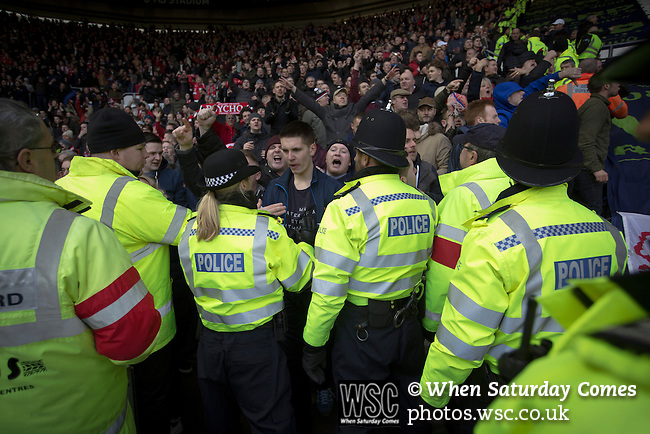
The steel pens and baton charges of the 1980s may be gone, but harsh and degrading actions by authorities are still part of the match day experience
29 March ~ When Diogo Jota scored a late winner at Nottingham Forest to take Wolves joint top of the Championship last September, travelling fan Stuart Booth (whose name has been changed to protect his identity) joined a melee bouncing around on the cinder track behind the Forest goal. A female steward was buffeted in the celebrations, and several of her colleagues set upon Booth. He was wrestled to the floor and forcibly restrained. Photos show him in a headlock gasping for air. Booth was arrested and charged with drunken disorder and threatening behaviour. He was found not guilty.
Football supporters in Britain no longer face the steel pens and baton charges that were so common in the 1980s. But harsh and degrading treatment at the hands of police and stewards remains a regular feature of the matchday experience. Lowlights of this season include Grimsby supporters being strip-searched at Stevenage, a young Manchester City fan pinned down by stewards after celebrating a last-gasp winner, and Sheffield United supporters missing the first half of a derby in a police kettle.
Criminality around football has fallen sharply since the 1980s, with 1,638 arrests in 2016-17 compared to 6,185 in 1988-89. As more than 45 million people attend UK football matches each year, the arrest rate of four per 100,000 compares favourably with Glastonbury festival.
But football fans as a social group are still too often regarded as a menace and treated accordingly. This is partly because discriminatory treatment is enshrined through a set of laws that apply exclusively to football fans, from drinking in view of the pitch to hurling “missiles”, a term that can include chewing gum and coffee cups. Actions that would be ignored in a town centre often lead to court appearances and banning orders for football fans.
Harsh policing is enabled by a wider culture that still sees football fans as “bottom of society’s pile”, according to Amanda Jacks of the Football Supporters’ Federation, who provides guidance for fans with legal issues. The attitude of politicians such as MP Philip Hollobone, who was swift to condemn England fans over clashes at Euro 2016 before evidence showed they were largely victims, and media who are happy to circulate lurid claims about supporters, helps to cultivate a climate in which it is “still too easy to blame supporters”, says Jacks, and “police know there won’t be any real scrutiny” of excesses.
Negative stereotypes have been internalised by fans, says Jacks, who have come to “expect and accept” harsh treatment at matches and rarely complain. After high-profile clashes between fans and stewards or police, fellow supporters often side with the authorities. But problems frequently arise because stewards are poorly trained and inexperienced with football crowds, according to Jacks. Many clubs hire jobbing nightclub bouncers with all the tact associated with that role, who are ill-equipped to keep order. As police withdraw from stadiums, stewards are being given greater responsibility.
Another source of tension is that policing techniques are outdated, says professor Clifford Stott, a specialist in crowd psychology and management at Keele University. He points out that where policing of public events such as protests has modernised in recent years, with a greater emphasis on human rights, football policing has been slower to change. “There needs to be recognition that we’re not in the 1980s, that football culture has changed fundamentally, and the threat posed by football fans is quite low,” Stott says. “There is still an expectation of disorder… [and] public order policing applied to football relies on coercive tactics that can lead to circumstances where supporters’ rights are infringed, they are contained, prevented from moving, or their privacy is invaded.”
Stott argues that such tactics are counter-productive as heavy-handed policing often antagonises supporters, which can lead to escalation and disorder. Instead, he supports greater use of police liaison teams that mingle with supporters and use a “dialogue-oriented approach… to negotiate solutions and de-escalate situations”. This strategy has shown promise in trials, and has the added bonus of requiring fewer police resources at a time of austerity and cutbacks.
Stott acknowledges institutional resistance to change, although some police forces are keen to forge better relations with supporters. PC Darren Balkham, football officer for Surrey and Sussex, is an admirer of Stott’s model and advocates “policing by consent”.
“There is no appetite to criminalise fans,” he says. “Engagement is the first tool, not a show of strength. Our behaviour can breed bad behaviour.” Balkham adds that football-specific legislation is “probably due for review” and that officers must show discretion with trivial offences.
Policing can certainly improve. But Jacks believes that fans have a responsibility to stand up for themselves and fight for the respect they are denied. “Fans should speak up more and not tolerate poor treatment,” she says. “They should ask themselves: ‘Would I tolerate this elsewhere?’ If the answer is no, don’t put up with it at football.” Kieron Monks
This article first appeared in WSC 373, March 2018. Subscribers get free access to the complete WSC digital archive – you can find out more details here
Photo by Colin McPherson/WSC Photos: Police watch over Nottingham Forest fans as they celebrate at the end of their match at Derby in 2015
